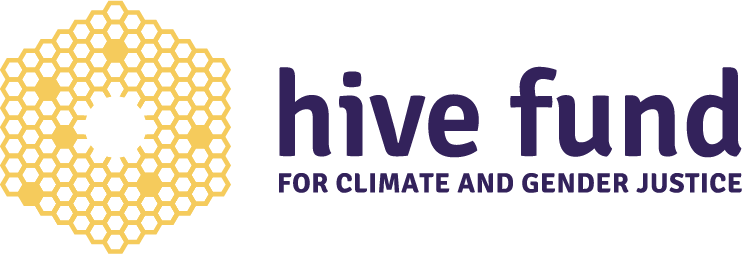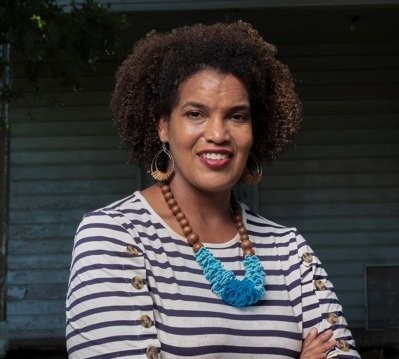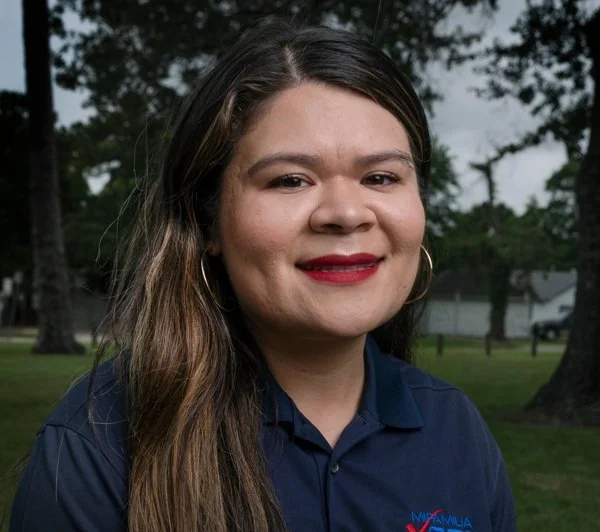Learnings from our Grantee Partner Listening Tour
In spring and summer of 2022, on the advice of our Participatory Decision-making Working Group, Hive Fund staff — along with advisors and allied funders — fanned out to meet in person with more than 60 grantee partners in Texas, Louisiana, Georgia, and North Carolina. Being together and seeing firsthand what groups are building and what challenges they face helped shape our theory of change, grant strategy, and ways we show up as a funding partner. The Listening Tour yielded insights that we are eager to share with fellow funders and others interested in moving toward climate, gender, and racial justice.*
Grantee partners want to spend more time “building the good” than “fighting the bad,” understanding that both are needed
“Building the good” is a way of approaching social change through an asset frame. Grantees asked to be recognized for the strengths they bring to the table, not just the challenges they face. They also stressed the value of proactive, versus purely defensive, strategies.
They reminded us that a key tactic of those who oppose racial, climate, and gender justice is to overwhelm organizations and communities with a relentless onslaught of policy, legal, and other fights to keep groups in a reactionary stance, pulling them away from enacting bold, proactive visions.
“Building the good” includes creating and implementing alternatives to dirty and unjust energy systems, shaping new narratives, and fighting for the things we love. Groups are ready to take full advantage of this historic momentum for and investment in climate justice to position Black, Brown, and Indigenous communities as both leaders and beneficiaries of new clean and just economies.
What funders can do: Shift mindsets and practices in philanthropy to recognize community-based organizations as architects and drivers of climate justice solutions. Engage and resource these organizations not only to fight current harms, but also to envision and build alternatives. Provide general support so groups have the flexibility to find where there’s traction to propel progress, instead of tying them to narrow and short-term campaign goals.
“We wanted to present other sides of our history, like the folklore that has been so rich in our lives…We really saw the opportunity for economic development and the need to have industry outside of heavy polluting industry and petrochemical industries…We are fighting to protect our land and our community, rooted in us being able to find that history.” - Joy Banner, Descendants Project
“People are looking to celebrate who they are, the cultures and families and communities that they come from. I think so often the movement can feel like anger or protest or barriers or challenges—which is necessary, but more importantly we can build on how people feel in community and the things that they love about their communities.” - Logan Burke, Alliance for Affordable Energy
Grantees need more direct support for communications and narrative work to combat misinformation, connect people to issues, spark imaginations, and inspire action.
Many grantee partners have powerful stories, unique perspectives, and the desire to be more engaged as spokespeople, but lack the capacity and access to elevate their voices. Grantee partners expressed a significant need for more dedicated communications staff, training, data analysis, and access to tools and technology. Groups also understand that communications efforts that are framed well and echoed across many groups help shift narratives and influence broader audiences.
What funders can do: Resource organizational and collective capacity for narrative building over the long-term. Increase communications support for place-based environmental and climate justice groups.
“Our fight is about more than stopping the oil and gas industrial build-out. At the root, there is an exploitative relationship between the powers that be, the people, and the environment. The real fight is to expand our imagination about believing we deserve better.” - Isabel Araiza, For the Greater Good
Achieving lasting change requires building and flexing power at the level of government. Plant-by-plant campaigns and other local battles can be waged in ways that build power for larger systems change.
Laws, policies, and public budgets are necessary to facilitate an equitable energy transition at the transformative scale needed. Grantees that are working on local permit fights or specific enforcement cases are asking to be more connected with broader campaigns to shift policies and laws at the systems level. Grantees are finding power in coalitions and formations that connect and integrate year-round civic engagement, community organizing, policy advocacy, and decision-maker education — especially when directly-impacted communities are able to play central roles.
What funders can do: Understand that just getting a law or policy passed does not mean that change will happen. Sustained funding for implementation, defense, and enforcement are critical and under-funded. Increase support for organizations and coalitions that understand how to build people power, how to work across issue silos, and how to build powerful multiracial coalitions. Provide multiyear funding to cement and build on victories.
“Because we're grassroots and we also work in electoral cycles, there's this perception that we move cycle to cycle. But in reality, we build foundations of community and community organizing and campaigns, and elections are just opportunities to engage folks for the long term.” - Angelica Razo, Mi Familia Vota
“Power responds to power. And if you don’t have it, you can march all you want, but they won’t listen. Every day we are teaching adults where power is and how democracy works, so we can make it work for us.” - Elizabeth Valdez, Industrial Areas Foundation
Organizations want to collaborate more.
Collaboration is powerful, but also something that requires emotional intelligence and labor, skill in working across difference, and a lot of time. This critical work and expertise is often gendered and undervalued. Leaders, especially women of color, are asking for collaborative work to be seen and valued, instead of being done after hours and on the side of the “real” work — a recipe for burnout. Grantee partners are asking for facilitators and other support to build healthy collaborations, and for funding to address the staff capacity needed to participate in collaborative efforts.
Implication for funders: Fund constellations of organizations working in a geography to increase opportunities for collaboration and complementarity and reduce competition among partners. Fund shared movement resources and infrastructure (without forcing it) and give smaller groups capacity to join coalition efforts.
“Our vision by 2030 is being able to support a more robust ecosystem that represents truly grassroots formations, and having a seat at the table alongside the multi-million-dollar 501(c)(3)s that have been at this table for years. And in a way that is not tokenizing, but is about really representing the needs of communities.” - Serena Sebring, Blueprint NC
Healing justice and holistic security are critical to addressing trauma and burnout and maintaining the long-term strength and vitality of leaders and movements.
Staff and volunteer leaders at grantee organizations are often under-paid and stretched thin juggling in-coming demands at a relentless pace. Women and people of color are emotionally taxed managing the compounding trauma from generational and on-going racism and sexism.
Burnout, conflict, and illness take a toll on the movement, but can be diminished if we’re intentional about resourcing the people doing this incredibly important work with tools for collective care and building power to change the systems causing the harm.
Implications for funders: Validate and normalize organizations dedicating budget and time for healing justice and holistic security tools and practices. Ask grantees about what they need to advance healing, wellness, and security in their organizations. Get rid of limits for “overhead” in organizational budgets. Express gratitude.
“A lot of our work is directly tied to trauma: there is hurt and anger. Leaning more into healing and security for staff is important because we often mask these feelings and feel guilty about taking breaks in order to provide support to the community. It’s hard to move beyond hurt and anger while many of our people are experiencing it.” -Hive Fund grantee partner
“I see it happen in every organization in this area, where the leaders and the worker bees are over capacity because they're so passionate about what they do, that there’s never a point of rejuvenation…We need community capacity for care and healing.” - Chester Williams, A Better Change, A Better Community
Groups want the financial security and flexibility to be able to play the long game: develop bigger picture strategy and vision, do long-term planning, build teams, and have the capacity to respond to emerging opportunities.
Organizations led by people of color disproportionately receive smaller, shorter-term grants than their White-led counterparts, and people of color-led organizations are often bound to agree to funder-proscribed deliverables and metrics to receive funding. Grantee partners are seeking more collaborative and trusting relationships with funders to deepen understanding about what it really takes to achieve shared goals. Many expressed a desire to be seen as partners who bring strategic expertise in addition to their implementation skills.
What funders can do: Make larger, longer-term, flexible grants and renew them. Sustain funding over longer periods of time to match how social and systems change happens. Examine and address biases — for example, around “absorptive capacity” and grant-practices that can manifest in smaller and shorter-term funding for groups led by and working with people of color.
“A lot of times people will invest in a thousand different environmental…models, but when it comes to similar issues within the Black community, [funders] only seem to marginalize engagement to one thing. A vast majority of White philanthropy wants to hear how many doors you will knock, and how many voters you will turn out, and nothing regarding systemically changing the laws affecting the Black community.”– Marcus Bass, North Carolina Black Alliance
“Multi-year general operating [support] allows groups to resource ideas and collaboration rather than a set of very particular tasks that feel more transactional… What we can learn from the other side is they fund ideas, and they fund them for decades, and then it comes to fruition.” - Anika Fassia, We Make the Future
Grantee partners want to focus their limited time on the most meaningful work.
Groups we spoke to are experimenting with creative and innovative ways to make progress. Learning from these types of experiments is not possible if groups are bound by funder-proscribed metrics and deliverables, and under pressure to write lengthy grant proposals and reports. Additionally, some grantee partners expressed that they don’t feel they can share challenges and shortcomings with funders and still be trusted and funded in the same way that White male counterparts can. When partners can’t share the fullness of their experience, we get a fractured understanding of the landscape and lose essential insights on what it takes to make progress. Grantees also asked funders to organize among ourselves as much as we can so that we take up less of their time requiring them to share the same basic information with us in numerous separate meetings.
What funders can do:
Change the way we define what outcomes matter. Focus on more meaningful metrics of success that include qualitative data and stories just as much as (if not more than) easily quantitative outputs. Build relationships with grantee partners to better understand their strategies and approaches and lean into a culture of collaboration and learning. Reflect on and change our own grantmaking practices to reduce the administrative burden on grantees. Get as organized and aligned as we can among funders with shared grantee partners.
“Funders can walk a little bit back from quantitative data and see the importance of qualitative data. Because it's not just about how many bodies you were able to pack into a room, but how many people have you had a deep impact with that you know that that relationship is then going to blossom to something else in the community.” –Jacqueline Than, VAYLA
“...How do we get clear on the things that can be measured in traditional ways, and then also how do we introduce other non-traditional ways of measurement? In my experience, funders and philanthropy have not always been open to some of the things that feel more qualitative." - Brionte McCorkle, Georgia Conservation Voters
How Hive Fund is applying these learnings
We revised and re-oriented our goals and strategic areas of focus to prioritize proactive efforts to advance an equitable transition to renewable energy.
We rolled out and expanded our climate finance program faster than expected to support the development and implementation of financial tools and build capacity for groups to draw public funds for climate justice projects in key urban and rural geographies.
We’ve begun a process to make all of our communications with grantee partners, including grant proposals and reports, as meaningful and beneficial to grantee partners as possible. This means minimizing the amount of time grantees spend responding to requests, and maximizing the time spent in shared learning that helps us progress toward goals and helps grantee partners access the funding and other support they need.
We will continue to dedicate staff time to aligning with allied funders so we don’t overwhelm the same groups with requests for the same information.
We will continue to fund constellations of organizations within a geography using different strategic approaches and tactics to maximize short-term wins in ways that build power and momentum for longer-term systems change.
We will continue to provide practitioner support for grantees wanting to understand how to more deeply incorporate healing justice and holistic security tools and practices, and increase funding for field-building efforts so that more skilled and movement-aligned practitioners are available. We have also begun an internal process to explore how we adopt healing justice and holistic security practices internally.
In 2023 we will explore opportunities to expand our participatory approach to grant-making in ways that more systematically offer grantee partners the opportunity for deeper input.
In 2023, we also plan to deepen our learning on the relationship between gender justice, climate justice, and efforts to build and flex power.
Read our Triennial Report to learn more about the strategic approaches we identified from the listening tour.
*FSG, a social impact consulting firm, supported analysis of grantee partners’ input during the Listening Tour and helped us develop the following inter-connected takeaways based on what we heard from partners.










